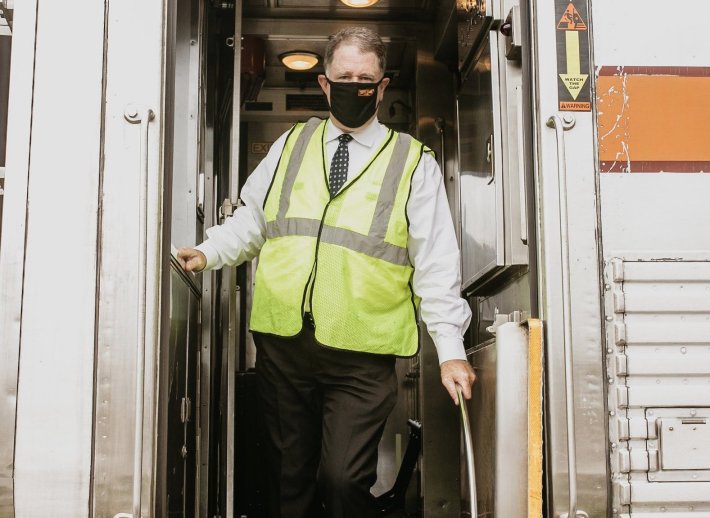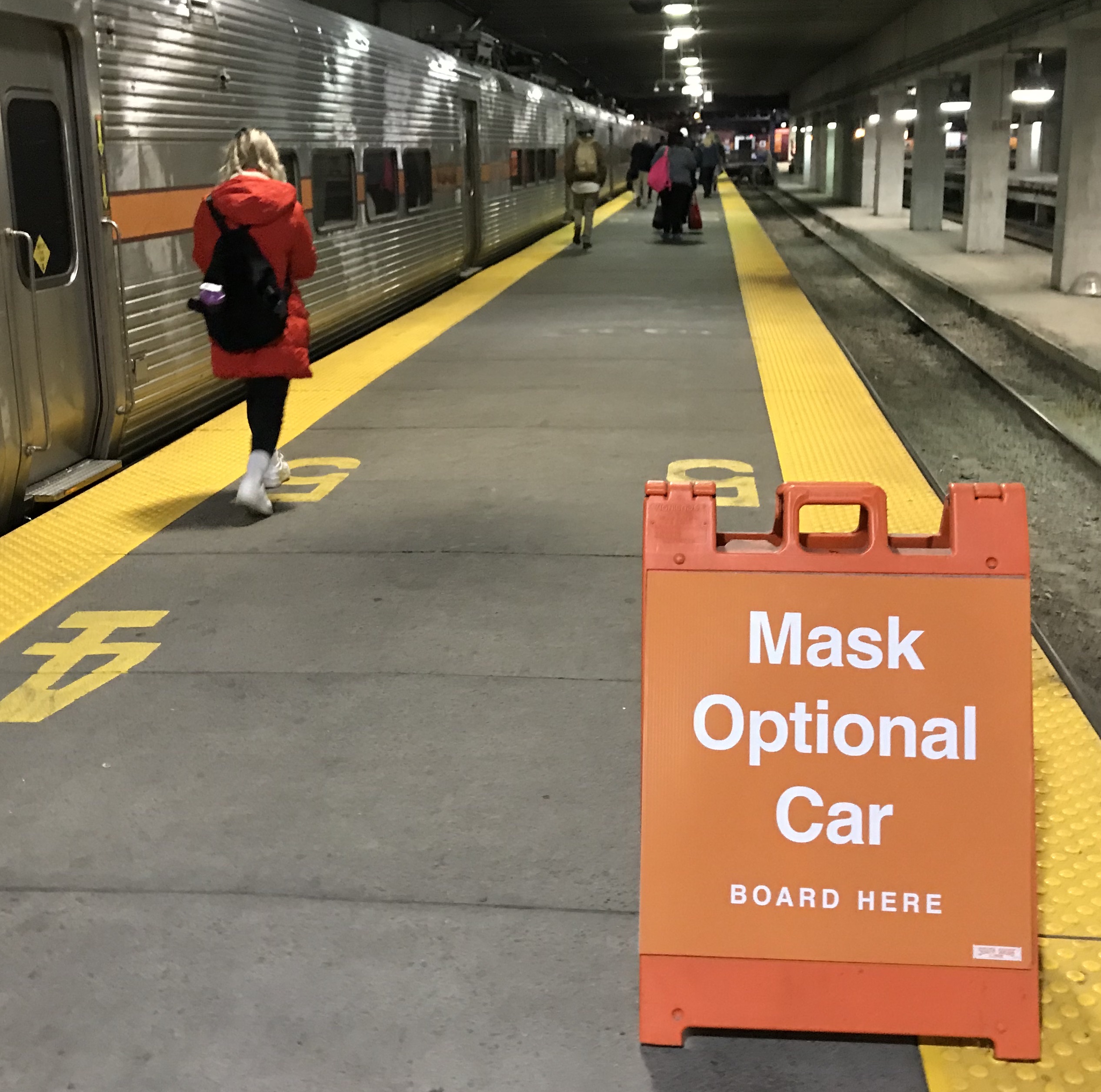COVID-denier cars. Flat-earther carriages. Anti-masker accommodations. Trump trains. Whatever you called them, the South Shore Line commuter rail line's Mask Optional Cars policy was a vexing pandemic strategy.
In September Mike Noland, president of the Northern Indiana Commuter Transportation District, which runs the railroad, told me this was a last-resort strategy to help keep mask-compliant customers safer by quarantining COVID Karens and Karls. Indiana governor Eric Holcomb issued an executive order in July requiring masks in indoor public spaces, including transit, Noland argued that the law was unenforceable because it didn't include a requirement that businesses and transit systems deny entry to barefaced Hoosiers. “If [riders] don’t want to comply, there’s not a whole lot we can do,” he said. “If [elected officials] give us a law we can enforce, we’ll pivot.”
While CTA, Metra, and Pace generally don’t refuse service to passengers who won't wear masks either, at least they don’t advertise the fact that you can get away with ignoring pandemic safety protocols. Dr. Richard Novak, chief of infectious disease at University of Illinois Chicago, blasted the Mask Optional Car policy as “a bad idea” and "foolish," asking "Do they have people sign a waiver when they get on the train in the event they get COVID-19?"
Sounds fairly similar to having a “public urination car”. I sympathize with employees tasked to enforce mask policies. Don’t know what they do normally with unruly passengers (stop the train? Call the police?). But it seems insane that they’d authorize ignoring the mandate.
— Adam Gibson (@apgibson42) November 18, 2020
During the two times I rode the South Shore on camping trips to the Indiana Dunes while the Mask Optional Car policy was in effect, there were a handful of people in the COVID carriage who wear mask-less. On the second occasion, coming home from the national lakeshore in the late afternoon on a Sunday, the train appeared to have only two open cars. The normal car had 100-percent compliance, but was too crowded for social distancing, with most of the seats occupied. The Karen carriage was only moderately full, but about a third of the riders were bare-faced. It was a no-win scenario.
Thankfully, in response to the recent 200-percent spike in COVID cases in Indiana, which followed the full reopening of the state in late September, Holcomb updated the state’s COVID-19 executive order, including new enforcement guidelines applicable to mask use, effective last Sunday.
As a result, the South Shore Line stated on Sunday, “The SSL will strictly enforce the mask mandate at stations and on trains. Passengers who do not comply with the order will be subject to removal from trains. In accordance with the revised executive order and the new enforcement provisions, the SSL will discontinue use of the ‘mask noncompliance’ car, effective immediately.”
I reached out to Mike Noland to get more info on how the decision to abolish the coronavirus carriages was made, and how it's working out. The interview has been edited for length and clarity.
John Greenfield: What changed on Sunday that made you feel comfortable getting rid of the Mask Optional Cars?
Mike Noland: When we last talked, what I explained to you was that we have a mask requirement on the train, but there was no enforcement provision, and that's why we went to the Mask Optional Car, or we call it the "mask noncompliance car." Where someone was refusing to comply with the mask requirement, we'd put them all in particular place, because we didn't have an enforcement mechanism.
But the new executive order from the governor mandates that businesses not permit individuals to come inside their facility [without a mask or face covering] and empowers law enforcement to enforce that order. That gave us the mechanism that we needed to go from the policy that we had to go to strict compliance. That's where we are right now: You wear a mask or you're removed from the train.
I had our [attorney] take a look at the [updated executive order] and I had them review policy and the approach that we were going to use, and they agreed with the general sense of what I just gave you. Which is, we as a business in the state of Indiana need to comply with this mandate, and failure to comply could subject businesses to fines, all the way up to a cessation of business. And we're going to protect the service. So that gave us the ability to go from where we were before to a completely different approach, which was complete compliance is required.
Of course, there's always exceptions for individuals who have medical conditions, or children eight and under [unless required by a directive in the executive order.] But aside from that, we're going to require that you wear a mask. If not not our crews will call the transit police and have you removed from the train.

JG: What kind of feedback have you gotten since you changed the policy?
MN: So far extremely positive. We've only had one individual, and I found out about it this morning, who was on our late-night train and refused to wear a mask. He was actually given a mask anyway [by the conductor] and still refused. The transit police met him in East Chicago and removed him from the train. So we put this in place on Sunday and this is now Wednesday. We've had one incident over the last three days.
JG: We there any charges for him?
MN: No, he agreed to leave the train peaceably. Now, if this becomes a repeat condition we'll take additional action. But the individual voluntarily left the train when our officers got there.
JG: OK, so that sounds like that was a pretty ideal enforcement situation: You got what you needed without anyone having to go to jail or anything. [It's worth noting that any additional police involvement in enforcement increases the chance of a conflict escalating to violence. But I'd argue that, in a life-or-death public health matter such as the pandemic, it's appropriate to involve police if necessary.]
MN: That's right. As you might expect, we're monitoring this on a daily basis and it's been well-received by the crews, and so far it's been very well-received by our riders. We just haven't had any substantial pushback. They understand what's in the governor's order and they understand why we're doing it. So far so good.




